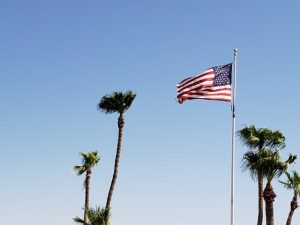Currently, flag burning is not illegal in the United States. The Supreme Court of the United States in its decision from 1969 has ruled that the burning of the flag is protected by the First Amendment. However, the person who burnt the flag can be found guilty of a misdemeanor for starting a fire without a permit.
Interesting that the burning of the flag has been against the law until 1969. The first U.S. Supreme Court ruling on flag desecration was passed in 1907 in the Halter vs. Nebraska case. Most early flag desecration statutes prohibited:
- Disrespect to the flag in any way
- Burning a flag
Later, in 1968, Congress responded to the burning of the American flag in Central Park as a protest against the Vietnam War bypassing the Federal Flag Desecration Law. This law prohibited any display of “contempt” directed against the flag. Thus, the burning of the American flag had been illegal until 1969 when the Supreme Court ruled the decision to award the First Amendment protection to the burning of the flag.

When Does Flag Burning Become Illegal?
Furthermore, in a few court cases, it has been declared that it is only illegal to burn the US flag if the flag would be stolen. In fact, burning the flag is one of the approved ways to destroy a too worn or torn flag.
For the past 20 years, Congress has made seven attempts to overrule the Supreme Court decision regarding the burning of the American flag by passing a constitutional amendment that had an exception to the First Amendment and allowed the government to ban flag desecration. The Amendment was first proposed in 1990 but failed to receive the required two-thirds majority votes of the House. After 1994, when the Republicans took over the Congress, the Amendment has consistently passed in the House but failed in the Senate.
